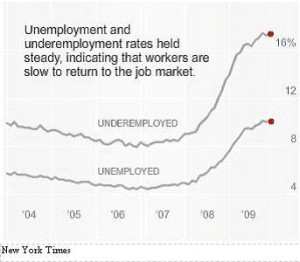On an annual basis U.S. GDP rose 5.7% in Q4 of 2009. On the surface, the number was excellent. However, more than ½ of the growth was built on replenishing inventory.
Exports rose 18.1% probably because of increasing global demand and a weak dollar. Business capital spending exceeded expectations.
It is not likely this rate of growth is sustainable. Household debt has just begun a long descent which is reflected in soft consumer spending. We have seen mixed corporate earnings reports in a market where more positive news is needed to continue the upward move. There is no indication of increased hiring. Note the divergence between unemployed and underemployed in the graph below.
Stricter lending standards mean banks are reluctant to lend to any but the best of credits. In fact, January 2010 saw another 14 small banks “not too big to fail”, closed. This compares with 140 in all of 2009. These are typically the banks that small business goes to in order to get financing.
There is increased talk of a Fed “exit strategy.” While there appears to be little chance of greater inflation at this point, due to high unemployment and excess production capacity, U.S. public debt has risen to $7.7 trillion versus an average of $5 trillion in 2007. And the money supply has exploded. Mark Gilbert’s article in the 01/11/10 issue of Business Week entitled, “The Fed’s Next Act Could Be Its Hardest” is indicative of market participants’ apprehensive mood.
U.S. monetary and fiscal tightening will play a significant role in determining economic growth in the U.S. and ultimately Canada. The recent Republican Senate victory may lead to a more fiscally conservative Congress. Although, the Democrats still have a majority. Does the Bank of China’s recent monetary tightening indicate the beginning of higher rates world wide? It never did go into a recession, just a slow down.
President Obama wants to increase growth through increased exports? This is already occurring; but likely on a weak dollar. Since Japan is in an economic malaise and the Euro zone is dealing with major problems with PIIGS, Greece in particular, will the dollar remain weak? It is certainly in U.S. interests that it does so. It would appear also that it is a desire of the President, even while Treasury Secretary Geithner officially calls for a stronger dollar. And a weak dollar means stable interest rates for some time to come.
To some extent, Canada is decoupling from the U.S. We will continue to sell our abundant natural resources to the Americans but those resources will also be a significant driver in expanding trade with the Asian Tigers. This will lead to stronger stock market indices in Canada than in the U.S. and a stronger Canadian dollar. The commodity play is not over yet. With stable interest rates in the U.S. and continued strength in our dollar, the Bank of Canada will have little choice, but to leave interest rates where they are for an extended period.
Now, that you know our opinion - what’s yours? Do you agree or disagree? We look forward to reading your comments!
{ 1 comments }






